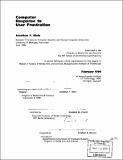Computer response to user frustration
Author(s)
Klein, Jonathan T. (Jonathan Tarter), 1962-
DownloadFull printable version (14.34Mb)
Advisor
Rosalind W. Picard.
Terms of use
Metadata
Show full item recordAbstract
Use of computer technology often has unpleasant side effects, some of which are strong, negative emotional states that arise in humans during interaction with computers. Frustration, confusion, anger, anxiety and similar emotional states can affect not only the interaction itself, but also productivity, learning, social relationships, and overall well-being. This thesis presents the idea of designing human-computer interaction systems to actively support human users in their ability to regulate, manage, and recover from their own negative emotional states, particularly frustration. This document describes traditional theoretical strategies for emotion regulation, the design of a human-computer interaction agent built by the author to actively help relieve frustration, and an evaluation that shows the effectiveness of the agent. A study designed to test this agent was conducted: A system was built that elicits frustration in human subjects. The interaction agent then initiated several social, emotional-content feedback strategies with some of the subjects, in an effort to help relieve their emotional state. These strategies were designed to provide many of the same cues that skilled, human listeners employ when helping relieve strong, negative emotions in others. Two control groups were exposed to the same frustrating stimuli, one of which was given no emotional support at all ; the other enabled subjects to report problems and "vent" at the computer. Subsequent behavior was then observed, and self-report data was collected. Behavioral results showed the agent was significantly more effective than the two controls in helping relieve frustration levels in subjects. These results demonstrate that strategic, social, emotional-content interaction with a computer by users who are experiencing frustration can help alleviate this negative state. They also provide evidence that humans may benefit emotionally in the short term from computers that respond in socially appropriate ways toward their emotions. The implications of this work suggest a wholly new role for computers in human life. Sociological ramifications of this new role are also discussed.
Description
Thesis (S.M.)--Massachusetts Institute of Technology, School of Architecture and Planning, Program in Media Arts and Sciences, February 1999. Vita. Includes bibliographical references (p. 155-159).
Date issued
1999Department
Program in Media Arts and Sciences (Massachusetts Institute of Technology)Publisher
Massachusetts Institute of Technology
Keywords
Architecture. Program in Media Arts and Sciences